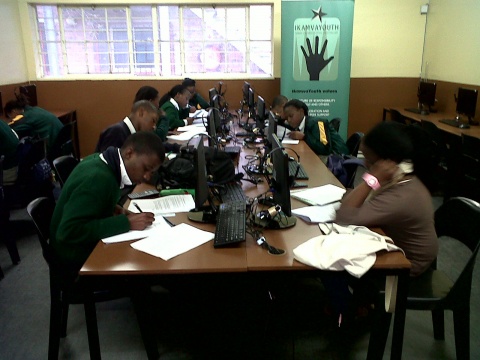

Nyanga branch continues to benefit from IY’s relationship with our partners and sponsors. In July this year, we shared on our Facebook group, that our computer lab was being installed . Today, barely 3months later, we sit beaming with pride and amazement at what the computer lab has enabled us to achieve in such a short space of time. Our Grade 8s, 9s and 10s have each had 22 sessions of Khan Academy, a Maths tutoring program aimed at helping learners hone their Math skills and in our learners’ case, also get regular and ongoing exposure to computers. Our Grade 11s have had 7sessions of Operation Fikelela, our computer literacy program, facilitated by our dedicated volunteers. All our Grade 8s, 9s and 10s each have their own email addresses and are excited to discover a world wider than their own, through the internet.
A very special thank you to all our partners who have made this possible; Andrew Einhorn, the US Embassy and thePotter Foundation. Your support is greatly appreciated here at Nyanga.


For the past 2 months Michael McLean from Trinity College has been working at Ikamva Youth’s Makhaza branch as an intern. He had a range of responsibilities, but was primarily tasked with creating English lessons and a framework through which future tutors can work. He has identified some of the things the students are having difficulty with and below are some of the things he has done as part of his English lessons.
Exercises
Grammar
One of the primary issues that learners face is a lack of grammatical skills. They especially need help with concepts like parts of speech, contractions, and punctuation. The website English for everyone provides a number of useful exercises. The following is an example of a punctuation worksheet we used.
Full stop Marks the end of a sentence.
Examples:
- I am a boy.
- I am a grade 12 learner at Chris Hani High School.
- My favourite South African singer is Zahara.
- I want to do medicine at the University of Cape Town.
- I do not like dogs.
Note– After a full stop, you have to start the next word with a capital letter.
Example– I have one sister. Her name is Nikiwe.
Comma– Used to join two different statements into one sentence. Also used when listing things.
Examples:
- He is a very smart boy, but he does not like to do his homework.
- I have apples, oranges, bananas, and apples.
- My dad and I like to go fishing, swimming, and hiking on the weekend.
- Jonas likes to watch movies, play games, and sleep.
- Katie talks to her mom, dad, brother, and sister.
Question Mark– Used at the end of a question.
Example:
- What is your name?
- How old are you?
- What is your favourite movie?
- Who is your favourite actor?
- What time are you going to Shoprite?
Apostrophe- Used to indicate that something belongs to someone/something
Example:
- My father’s family is from the Eastern Cape.
- Nelson Mandela’s book is very inspiring.
- The children’s clothes are very dirty.
- This is my teacher’s pen.
- My friend’s dog is very loyal.
Fill in the Blanks with the appropriate punctuation sign.
- What time does the bus arrive _____
- My favorite food is Hungry Lion _____
- The baby cub likes to snuggle up to his mother to keep warm _____
- Do you know how to ride a bicycle _____
- What is your favorite season _____
Add commas, full-stops and question marks where appropriate.
- Did you have chicken rice and soup for lunch
- Where are the spoons forks and knives
- After school I will read do homework and go to bed
- Yellow blue brown green and blue are my favorite colors
- The salad has lettuce tomatoes and dressing
Rewrite the following sentences and use the apostrophe sign.
Example: These books belong to Tumelo. – These are Tumelo’s books.
- The car belongs to my mom.
- I just saw the car that belongs to your father.
- This playground belongs to the children.
- These books belong to my sister.
- The car that belongs to my father is very fast.
Reading
This is another important subject to cover. Fortunately, all you need is a book. Have learners take turns reading, helping them through the tougher sections or concepts. Take time to look up words that they don’t understand, and make sure that everyone understands what is happening in the story.
Speaking
Actually applying written skills to speaking can be a challenge for some learners, so some speaking exercises should be done. Of course they will speak when reading or explaining their answers to grammar worksheets, but a more direct approach can be taken. We did an activity called “topics from a hat.” Learners selected random topics which we had made beforehand (HIV, friendship, taking the train, etc). They then had 5 minutes to prepare a 1 minute presentation. The learner with the best presentation (based on length, clarity, substance, grammar, and confidence) received a small prize- in this case a piece of chocolate. These orals should be utilized in various forms and gradually expanded upon.
Spelling
Spelling was another problem area we identified. Like speaking, improvement can come simply from doing other exercises, but focusing on spelling specifically is a good idea. In our case we held a spelling bee. I created a list of about 50 words of varying difficulty. Learners went around in a circle, each attempting to spell a different word. If they were incorrect in their spelling, they were out, and the next person got a chance to spell the word (after 3 wrong, the next word was chosen). We also told them the correct spelling. Those who were correct advanced to the next round, which was more challenging, until only 3 were remaining. The top 3 received prizes. This activity was fun for the learners and encouraged improvement with those who did not do well.
Critical Thinking/ Writing
This was the last major issue that we found with regards to English. To address it, we have been using various exercises and activities. The following is an example. These usually take more time than simple grammar exercises, so be sure to schedule enough time for them to finish and for you to go over the correct answers. Critical thinking is about learners thinking outside the box, so this is an open-ended area, though worksheets are useful.
Identification of Cradock crash victims starts
A school bus and a Mercedes-Benz Sprinter minibus crashed on the R61 between Cradock and Graaff-Reinet on Saturday.
In the bus were staff and pupils, mainly from Cradock Primary School in the small Eastern Cape town, who were on their way to a sports event. In the minibus were adults and children travelling from Cape Town to Mthatha.
The police department said the most of the identification process would take place on Wednesday when relatives and next-of-kin arrived on a bus arranged for them by a private transport company from Cape Town.
“It is very traumatising. The department of social development will have social workers and counselors on hand to help with this.” Both drivers died in the crash. The school was closed on Monday as it came to terms with the tragedy, said Loyiso Pulumani, spokesman for Eastern Cape education MEC Mandla Makupula.
Deputy principal Alfie Blume was critically injured and was in hospital in Bloemfontein. Teachers Ray-Jean Wright and Jacques de Meillon were flown by helicopter to Greenacres Hospital in Port Elizabeth, for intensive care, reported The Times newspaper.
Pulumani said he would visit the school on Tuesday to express their condolences, and to see what help could be provided.
Pulumani said the crash had compounded an impending teaching crisis at the school as, besides existing vacancies, two teachers were booked off ill for treatment and recovery from cancer. Before the accident, the former model C school had applied for extra teachers. Now it had lost its principal, and was uncertain about when its deputy and the two other teachers would be able to return.
New Vocabulary
Traumatising-
Tragedy-
Injured-
Condolences-
Impending-
Questions (Answer the following questions with FULL SENTENCES.)
- What happened to the drivers of the two cars?
- Who else was involved in the car crash?
- Where were they travelling to?
- Why did the Eastern Cradock Primary School close on the Monday following the accident?
- How/Why did the car crash contribute to the teaching crisis at the Eastern Cradock Primary School?
Assignment
In a short paragraph, state and discuss the causes of car accidents in South Africa. Your response should be 10-15 sentences long.
Alternative Techniques
The aforementioned areas are important to focus on, but I have found that the structure is really up to you. If you have done a number of grammar exercises, switch things up and work on comprehension or speaking skills. You also have the freedom to be creative. We are planning on having a “Jeopardy” styled competition to test them on the grammar skills they have learned. We were also thinking about utilizing music. This could be done by playing a Bob Marley song and having them discuss its meaning, by giving the learners some song lyrics and having them identify parts of speech and summarize its theme, or by having the learners write an essay about their favorite music.
Conclusion
While the learners in Ikamva Youth certainly need to improve their English skills, they are also quite gifted and motivated already. All you need to do is provide them with direction. They need to specifically improve their grammar, spelling, speaking, reading, and comprehension, but if you provide a holistic and diverse range of lessons and activities, their improvement will be noticeable. Also, if you can build on previous lessons, that is ideal. Don’t just do an exercise and move on- cover the material again briefly before you begin another subject. Make sure that enough time is given for the work and that everyone understands what they just did. Finally, if you can make exercises relevant to their lives and have them reflect on broader social issues, then they will benefit even more from your tutoring. There is a fine line between applicable and holistic education and simple memorization, and Ikamva is striving for the former.

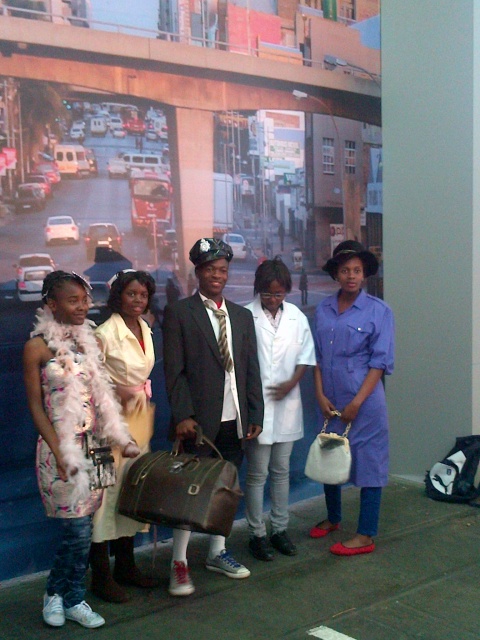
Who said young people couldn’t create, direct, produce, film and act in their own movie.
About 30 Ikamvanites in Gauteng had the opportunity on Saturday 22nd of September 2012, to go onto a professional movie set in Johanesburg at The Home Movie Factory and create their own master pieces.
The Home Movie Factory is an initiative created by Michael Gondry upon the idea that filmmaker creativity should be cultivated and shared as much as possible. Michael said,“I don’t intend nor have the pretension to teach how to make films. Quite the contrary. I intend to prove that people can enjoy their time without being part of the commercial system and serving it. Ultimately, I am hoping to create a network of creativity and communication that is guaranteed to be free.”
The Ikamvanites arrived to a ready-to-use film set and equipment which made an infinite number of storylines possible. The learners got to work independently and had creative control over all aspects of the movie and this included the genre and title of their film, the script, the acting and actual filming.

After three hours, the learners were able to see a screening of their film and were given DVD copies of the final product.
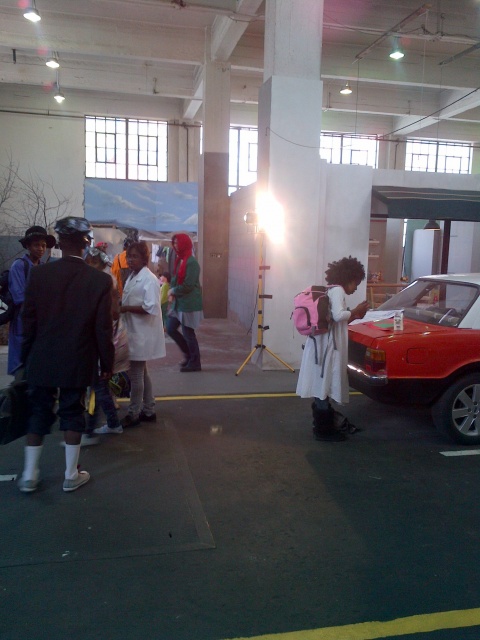
WOW is all I can say. It was amazing experience! We definately have some very creative young Ikamvanites here in Gauteng.
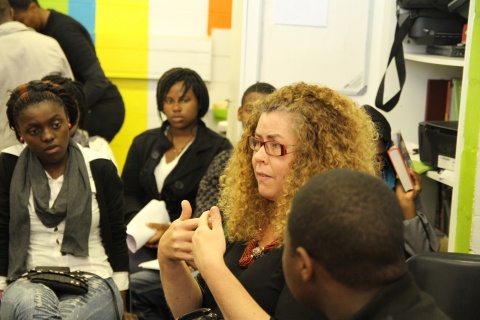
Heritage means a lot of things to a lot of people. This is a day in which we are all encouraged to celebrate our cultural traditions in the wider context of the great diversity of cultures, beliefs and tradition that make up the Nation of South Africa.
Ikamvayouth celebrated this day by inviting students and tutors from all 3 Western Cape branches at Makhaza branch. We had a debate and discussed issues around our heritage i.e. our tradition and culture, most specifically the Xhosa culture due to the majority of people present. This day was also scheduled to train Ikamva Youth Debating Teams on the current debating styles and techniques. We were very lucky to have the founder and Managing Director of Thetha Sikuve, who is also an executive member of UWC’s Debating Team, Ziyanda Tshoki. Ziyanda conducted the 2nd session of the day. A local Hip-Hop group under the brand “Lil’ Scratch Records” graced us with performances during our break Intervals.
During the 3rd Session we had live debates and students prepared for the FESTIVAL OF DESIRE that will be held on the 6th of October 2012 at UCT, hosted by African Studies Gallery’s Lecturer of Humanities Studies, Marion Walton
During the debates we discussed two topics, namely:
- If it’s vital to talk to the older generation about our Sexuality.
- In Today’s world you can’t be sexy or confident about your sexually without the right brands, clothing and look.
Ziyanda said that they had an absolutely lovely day training pupils debating for heritage day. She thanked everyone who contributed to this awesome day. She also thanked Sandzsation Tshefu and Ndima Lazola for the opportunity to work with Ikamvayouth, the tutors from Makhaza, Masipumelela and Nyanga branches, Mihlali Marx Mtoto for their vehicle and everyone else that formed part of this great occasion.

Marion said that she was highly impressed by how the debaters could think on their feet in response to the unprepared topics.
The 2nd topic “In Today’s world you can’t be sexy or confident about your sexually without the right brands, clothing and look” was chosen to be presented for the debate on the 6th at UCT. The tutors and our debate mentors, Sandiswa Tshefu and Ayanda Gladile, were part of the panel that chose the top 8 students that will represent IkamvaYouth at the festival at UCT.
We would like to thank Marion for the sponsorship to cover related costs, REEL-LIVES for their camera crew, the local Hip-Hop group Lil’Scratch and the tutors that attended. Most importantly, we want to thank Ziyanda for conducting the workshop. The day was a huge success because of everyone’s assistance.
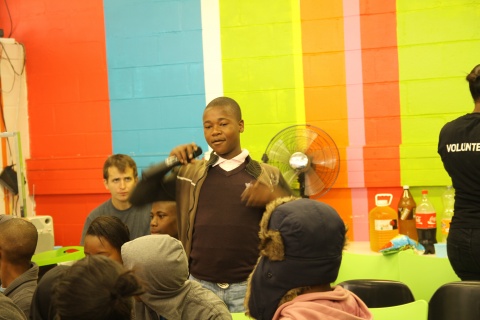
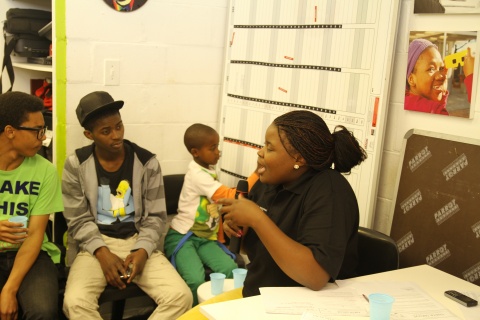
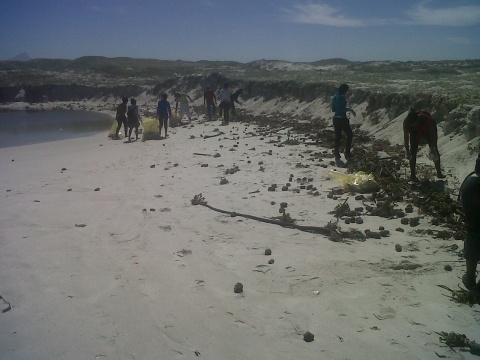
This past Saturday (15 September 2012), ERM (Environmental Resources Management) together with the Masi and Nyanga branches took to Muizenberg’s Sunrise beach for the Annual International Coastal Clean-up.
With the equipment sponsored by Plastics SA, the Ikamvanites and ERM staff picked up waste (i.e. plastic, paper, bottles – anything “unnatural”) on the beach. With just little time to do so, a lot of waste was picked up – Sunrise beach being one the mostly used beaches in the Southern Peninsula by humans. Great thing was that most of the waste was recyclable, so most of the things can be re-used again or something new can be created out of it.

Ikamvanites hard at work to keep their environment clean.
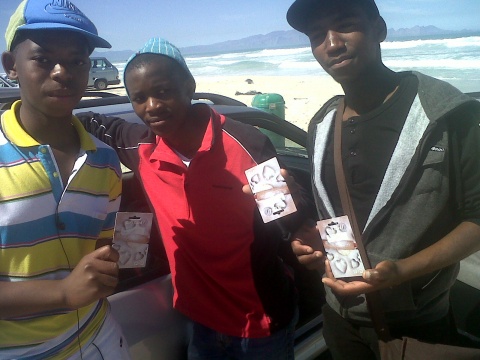
Learners who picked up the most waste got rewarded with Pick n Pay gift cards – above are those from Masi. From left: Sifiso Jim (Grade 9), Zukile Maweyi (Grade 11) and Robin Fuzile (Grade 11).
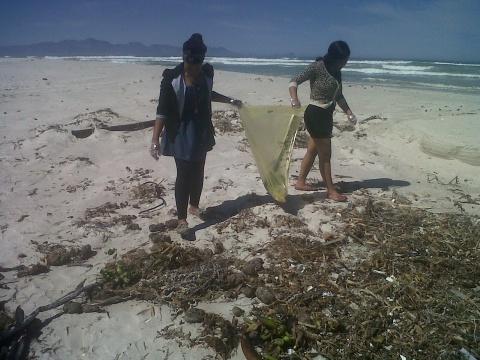
Team work…that’s how we do it at IY!
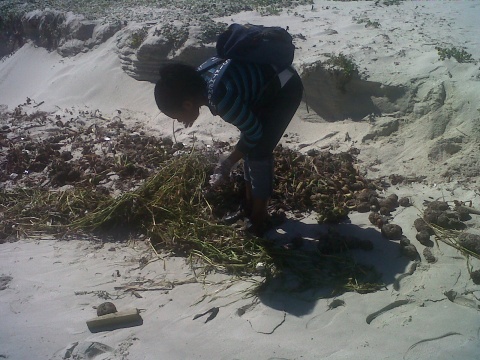
“Hmm is that plastic?”
Thanks to ERM and those who made the day possible! The learners had a great time and took away valuable lessons. We’re looking forward to more partnerships like this in the near future.
Here are more pictures from the Coastal Cleanup…
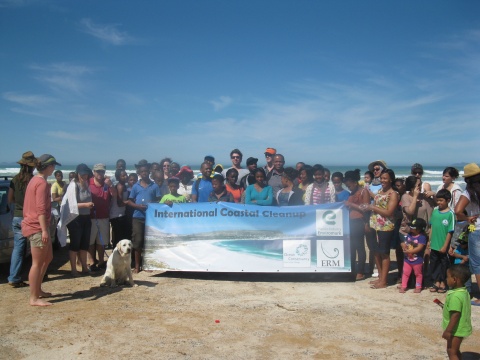
Everyone who took part in the coactal cleanup.
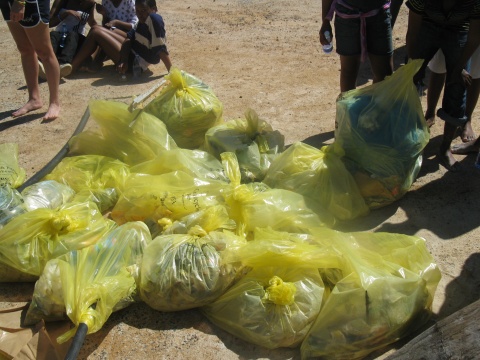
Some of the collected waste.
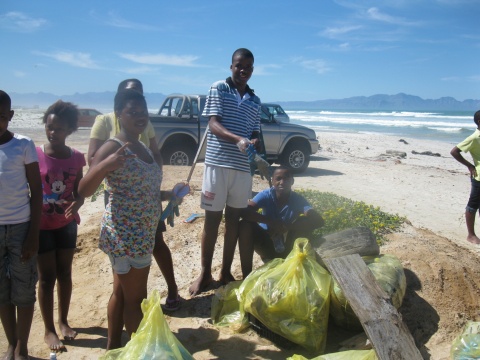
Nyanganites
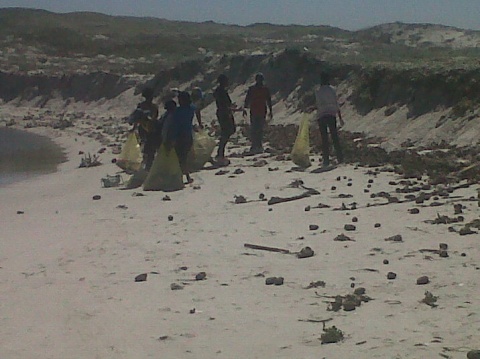
Masinites



















 Lloyd Lungu
Lloyd Lungu